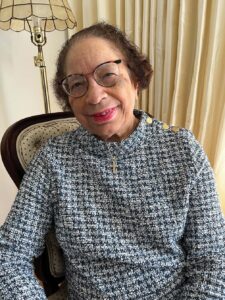Giving in Action: A Gift That Keeps On Giving
 From the time she was 8 years old, Annie Marie Garraway, PhD, and her family lived in the South, first in Alabama, then in Tennessee, and finally in Alabama again. Early on, she was aware of the Vanderbilt name and of Vanderbilt University specifically.
From the time she was 8 years old, Annie Marie Garraway, PhD, and her family lived in the South, first in Alabama, then in Tennessee, and finally in Alabama again. Early on, she was aware of the Vanderbilt name and of Vanderbilt University specifically.
“My late brother, Levi Watkins Jr., made the university real for me and my family when he became the first African American student to be accepted into, and to graduate from, the Vanderbilt University medical school in 1970,” explains Garraway. “He was elected into the Alpha Omega Alpha Honor Medical Society and blazed the trail for a medical school now nationally recognized for its admission of students underrepresented in medicine.”
In 1978, after his surgical internship at Johns Hopkins University Hospital, Watkins became the hospital’s first African American chief resident in cardiac surgery. During a break in his surgical training from 1973 to 1975, he conducted research at Harvard Medical School on the role of renin-angiotensin blockers in the treatment of congestive heart failure.
After completing his residency, he joined the full-time faculty in cardiac surgery at Johns Hopkins. In February 1980, he performed the world’s first implantation of the automatic implantable defibrillator in a patient, and subsequently developed several different techniques for implanting the device. Watkins also helped develop the cardiac arrhythmia service at Hopkins. He retired in 2013 and died in 2015.
Immediately after Watkins’ death, Garraway looked for ways to have an impact. She contributed to the Alice and V.K. Patterson Scholarship fund, the Irene Georgia Bedford Waters Scholarship fund, and the Phillip J. Browning, M.D. fund. She did this while preparing to establish the Levi Watkins Jr., M.D. Scholarship in late 2016.
“Years ago, the Vanderbilt University School of Medicine opened a long-closed door of opportunity to my brother. Since then, many other underrepresented minority students have followed,” Garraway said.
Preference in awarding the Levi Watkins Jr., M.D. Scholarship is given to students from underrepresented minority groups who demonstrate the excellence, strength of character and commitment to welcoming all exemplified by Watkins, as determined by Vanderbilt University.
“It has been especially heartening for me to read the letters from the recipients each year,” added Garraway. “The scholarship helps make the training required to become a medical professional more affordable. It helps any debt load that may materialize. Beyond that, I hope that the impact is to improve the opportunities for underrepresented populations in the medical field.”
Garraway believes a university can provide opportunities for education and training that simply do not exist elsewhere. “High-quality university education is expensive. Support from private individuals and the private sector is crucial,” she said. “For me, it is the best way to ‘pay it forward’ in recognition of the assistance he, and many other young people, received over the years. I want others to have the chances in life that we had.”
She added, “There are so many demands on our financial resources. So many of them are worthy, but we must make choices. I can think of only a few choices that are more impactful than contributing to a university to help train the next generation. This is one choice that you will not regret.”
